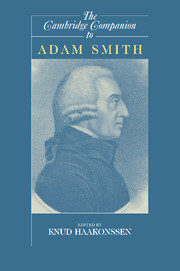Book contents
- Frontmatter
- Introduction: The Coherence of Smith’s Thought
- 1 Imagination: Morals, Science, and Arts
- 2 Adam Smith, Belletrist
- 3 Adam Smith’s Theory of Language
- 4 Smith and Science
- 5 Smith on Ingenuity, Pleasure, and the Imitative Arts
- 6 Sympathy and the Impartial Spectator
- 7 Virtues, Utility, and Rules
- 8 Adam Smith on Justice, Rights, and Law
- 9 Self-Interest and Other Interests
- 10 Adam Smith and History
- 11 Adam Smith’s Politics
- 12 Adam Smith’s Economics
- 13 The Legacy of Adam Smith
- Bibliography
- Index
2 - Adam Smith, Belletrist
Published online by Cambridge University Press: 28 August 2006
- Frontmatter
- Introduction: The Coherence of Smith’s Thought
- 1 Imagination: Morals, Science, and Arts
- 2 Adam Smith, Belletrist
- 3 Adam Smith’s Theory of Language
- 4 Smith and Science
- 5 Smith on Ingenuity, Pleasure, and the Imitative Arts
- 6 Sympathy and the Impartial Spectator
- 7 Virtues, Utility, and Rules
- 8 Adam Smith on Justice, Rights, and Law
- 9 Self-Interest and Other Interests
- 10 Adam Smith and History
- 11 Adam Smith’s Politics
- 12 Adam Smith’s Economics
- 13 The Legacy of Adam Smith
- Bibliography
- Index
Summary
The Lectures on Rhetoric and Belles Lettres as we have it does not derive from Smith's own text, which on his instructions was destroyed along with other unpublished literary materials shortly before his death. Rather, we owe the recovery of the contents of the lectures to the fortunate survival of a single set of student notes. Undoubtedly, these circumstances account for the fact that the work has not attracted as extensive or as detailed a body of commentary as might be expected in relation to a significant early work of such a central writer. Nonetheless, there are at least three contexts in which the Lectures on Rhetoric and Belles Lettres (henceforth, LRBL) has an interest. First, Smith was a pioneer in the university teaching of rhetoric at a time when, on this as on other subjects, Scotland was emerging as one of the most fertile centers of European thought. Although Smith's lectures remained unpublished, and therefore lacked the influence of either Hugh Blair's or George Campbell's works, they nonetheless have an important place in the history of eighteenth-century rhetoric and belles lettres. Secondly, the LRBL is an extended treatment of the subject that first engaged Smith's academic interests.
- Type
- Chapter
- Information
- The Cambridge Companion to Adam Smith , pp. 57 - 78Publisher: Cambridge University PressPrint publication year: 2006
- 9
- Cited by

